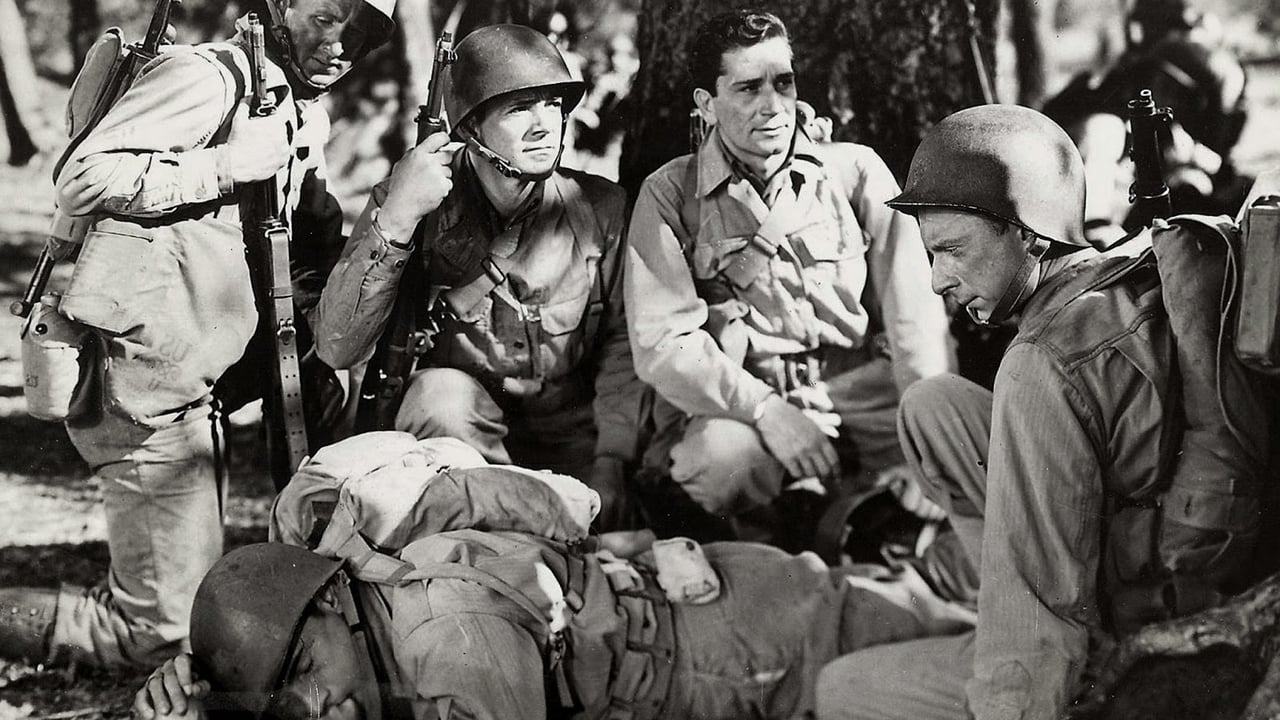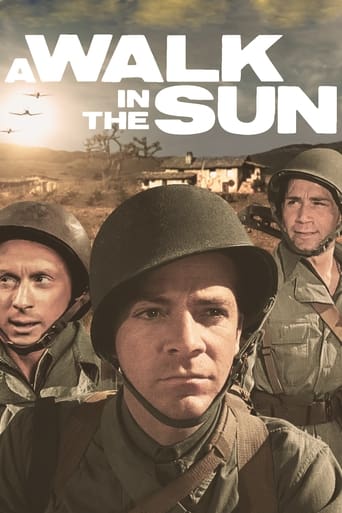writers_reign
If IMDb is to be believed this movie was released in December, 1945, some seven or eight months after the War In Europe ended so that in one way any anti-war message built into it was superfluous. Director Lewis Milestone who was, in fact, a fine all-rounder with a long career, will always be closely associated with All Quiet On The Western Front which dealt with the futility of war albeit World War One so it was perhaps natural that he repeat the lesson with World War Two. This movie is notable for its matter of fact acceptance of war as a natural recurring phenomena and one that makes little or no attempt to either glamorize war or paint a horrific picture of it. The main thrust is the six-mile trek by one platoon from a beachhead in Salerno inland to the farmhouse that they have been assigned to take and hold. En route we meet and get to know the typical Hollywood 'bomber crew' cross section of personnel with very little actual combat until the last couple of reels when they do, in fact, attain their objective. Certainly worth a look.
info-5918
Great War pic. Rather than being a propaganda piece like many moves were that were made during the war, an action movie, or following a formula, Walk in the Sun is main a drama focusing on a small unit, the individuals in that unit, and their objectives.Qutie realistic, it shows the confusion of war, the reality, and soldiers with mixed emotions about the business.The plot mainly focuses on a landing in Italy at Salermo, and one particular mission. The unit loses commanding officers, key personell loses equipment, and encounters difficult objectives. The tension that builds up at times is quite sustained.A realistic, intelligent and quite different war movie, definitely worth having a look at, particularly for 1945.
tieman64
"It was strange to be so close to things and yet so far away. That was war. That was always war. It was confused and it was incoherent and it was unreasonable. Nothing ever happened quite on time, nothing ever happened exactly as was expected. War, itself a paradox, was full of paradoxes. A platoon of men, in on the first landing on an enemy coast, could be completely bypassed by events. They could sit in a hollow while all around them things went, or should be going, according to plan, and while the platoon, itself an integral part of the whole operation, seemed to be entirely forgotten. Yet had the platoon been unnecessary, it might well have found itself caught underneath shells and planes. [...] But mostly, war builds patience. For war is a dull business, the dullest business on earth. War is a period of waiting. Each day of it is crammed with the little hesitations of men uncertain of themselves and awed by the ghastly responsibilities – the responsibilities of life and death, the responsibilities of gods – that have been thrust into their hands. The soldier waits for food, for clothing, for a letter, for a battle to begin. And often the food never is served, the clothing is never issued, the letter never arrives, and the battle never begins. The soldier learns to wait meekly, hoping that something will happen. And when the period of waiting is at an end, the something that does happen isn't what he expected. So in the end he learns to wait and expect nothing. That is patience, God's one great gift to the soldier. But he refuses to confess his patience. He curses the fact that he has to wait. He howls at those who cause the waiting. And that too is good, in a way. For the man who waits silently is not a good soldier. He is no more than a stone." - Harry Brown (excerpt from "A Walk In The Sun") Harry Brown wrote "A Walk In The Sun" in 1944, one of literatures great WW2 novellas. Brown, like Joyce, Hemingway and Mailer, other major war writers of the era, all had a terse, abrupt, economical, minimalist, gruff way with words – their prose flew like bullets, abrupt and to the point - possibly influenced by the unadorned style demanded by newspapers. Think the pulp poetry of Sam Fuller's war movies and you have their tone.Lewis Milestone directed many war films ("All Quiet On The Western Front", "Halls of Montezuma", "Pork Chop Hill"), most of which muddle together two entirely divergent and contradictory messages. Take "Pork Chop Hill", for example, a film about the Korean War which ignores the Korean War and instead curries favour with 1959 audiences by invoking the fears and necessities of the Cold War, a stance which needs to predict an optimistic, even a celebratory outcome and outlook. Since the substitution of the Cold War for the Korean War was deemed by Milestone incapable of being acknowledged, the film displays an ambivalence towards the entire Korean conflict and its consequences. So on one hand he wants to celebrate the soldiers of the Cold War, a war which he sees as necessary, whilst also mourning the loss of those who died and were squandered in the Korean conflict (historically a part of the Cold War), a stance which predicts a pessimistic, even a tragic outcome and outlook. This is a common dichotomy in war films; Celebratory vs Tragedy: it is in this fashion that most war films (most notably those which proclaim themselves to be antiwar) veer pathologically between antiwar statement and gung-ho propaganda.So Milestone's adaptation of Brown's "A Walk In The Sun" remains, perhaps, his less ideologically muddled film. It stars Dana Andrews as Sgt Tyne, a platoon squad leader who, after a botched beach landing in Italy, witnesses the loss of several of his men and is then tasked with capturing an isolated Nazi-held farmhouse. True to Brown's novella, most of the film consists of walking, huddling in the dark, chatting and hiding in bushes, the tale stressing the drudgery, boredom, long hours and mind-numbing banter that epitomises the life of a grunt. Unfortunately, the pleasure's of Brown's writing – his staccato dialogue, macho-poetic prose, rambling conversations which skitters across nonsense and profundity whilst revealing the hopes, thoughts and longings of his young, mostly lug-headed grunts – can't quite survive Milestone's translation to screen. It's good prose – take sequences in which grunts argue about dirt, their incessant walking and whether the human body is more complex than a leaf – but not the kind of prose that works well for cinema unless you have a skilled word-oriented director on tap (think, perhaps, Mamet, Hawks or Fuller).Regardless, this is an unusual and unique war movie, and one of the most interesting platoon movies of the 1940s.7.9/10 – Worth one viewing. Read Brown's book instead.

